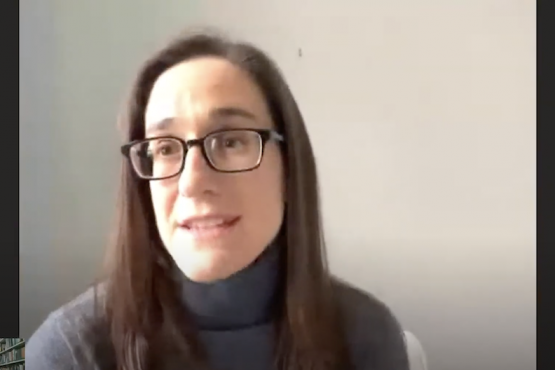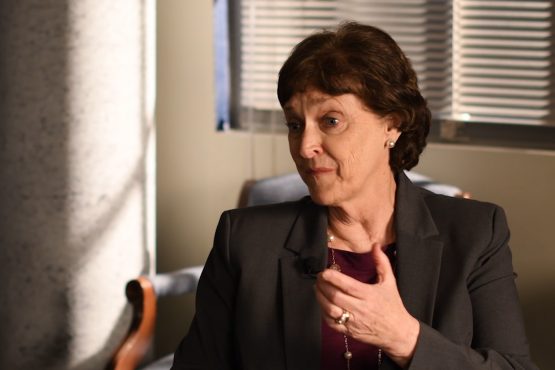Today’s episode focuses on telemedicine and telehealth. Today’s pandemic with staying at home and sheltering in becoming the new norm across America has catapulted telemedicine to the top of the healthcare delivery system. It provides convenient and rapid and affordable access to healthcare doctors and nurses. Our guest today is Ann Mond Johnson, CEO of the American telemedicine association, the ATA, the leading national organization whose goal is to promote expanded access to medical care for consumers and health professionals alike using telecommunications, technology and virtual care. The ongoing COVID-19 public health crisis has put a spotlight on telemedicine and the ATA, the American Telemedicine Association has helped lead recent efforts in Congress and around the nation to advance new access. Now more than ever, we are seeing the value of receiving treatment in the comfort and the safety of our own homes. I’m recording today from New Castle, Virginia, a town of 150 in rural Craig County in Southwest Virginia. Amongst so many other issues we talk about today. We will discuss the challenges of rural access and the ethical issues of addressing our most vulnerable populations. We are taping on Monday, March 23rd this is a rapidly evolving pandemic changing day by day, so please continue to follow the latest guidelines issued by the CDC Centers for Disease Control and your local authorities.
For News, Policy Updates, Webinars and other resources on telehealth during the coronavirus pandemic, visit the American Telemedicine Association’s COVID-19 page for the latest information.
Senator Bill Frist: I do hope that every governor listening to us right now in the next two hours calls the governors in the surrounding states and says, “Let’s set up an exchange, let’s agree on it right now so that we across state borders if the physician is licensed and credentialed in one state,” and has to be a state by state agreement, and I hope that that’s being done and I hope our governors will do that today. Today, on A Second Opinion, we bring you our sixth special episode in our continuing series of providing the most practical up-to-date real time information on the 2019 novel Coronavirus.
Senator Bill Frist: Today’s episode focuses on telemedicine and telehealth. Today’s pandemic with staying at home and sheltering in becoming the new norm across America has catapulted telemedicine to the top of the healthcare delivery system. It provides convenient and rapid and affordable access to healthcare doctors and nurses. Our guest today is Ann Mond Johnson, CEO of the American telemedicine association, the ATA, the leading national organization whose goal is to promote expanded access to medical care for consumers and health professionals alike using telecommunications, technology and virtual care. The ongoing COVID-19 public health crisis has put a spotlight on telemedicine and the ATA, the American Telemedicine Association has helped lead recent efforts in Congress and around the nation to advance new access.
Senator Bill Frist: Now more than ever, we are seeing the value of receiving treatment in the comfort and the safety of our own homes. I’m recording today from New Castle, Virginia, a town of 150 in rural Craig County in Southwest Virginia. Amongst so many other issues we talk about today. We will discuss the challenges of rural access and the ethical issues of addressing our most vulnerable populations. We are taping on Monday, March 23rd this is a rapidly evolving pandemic changing day by day, so please continue to follow the latest guidelines issued by the CDC Centers for Disease Control and your local authorities. Now please join me and our guests for this special edition of A Second Opinion.
Senator Bill Frist: Coronavirus pandemic has brought to the forefront the critical role that telehealth can play in our clinical system, in our medical system and our infrastructure through out. Most people have never thought of using telehealth and some might even still be fearful that it will not be as effective as an in person visit or it will be a lot more expensive or their privacy concerns that really need to be top of mind. Let’s open with what is telehealth and then how has the Coronavirus changed this whole concept of telehealth? And you could talk a little bit about the technology that is being used today.
Ann Mond Johnson: Sure. There’s a lot of verbiage that’s used to describe telehealth. There’s telehealth, there’s telemedicine, virtual health, digital health, connected health, it goes on and on. But I think the main point is that it’s the ability to provide services using technology. This is both provider to provider as well as provider to patient. We also talk about it as being synchronous or asynchronous, and asynchronous is not very meaningful from a consumer’s vantage point, but think of it as chat, the ability to send something and it’s received and then it can be responded to. So synchronous is what we’re doing right now, real time and asynchronous is like chatting with your children or grandchildren.
Senator Bill Frist: From a technology standpoint, when people hear telehealth, right now, are they thinking video or are they thinking telephone or are they thinking both?
Ann Mond Johnson: I think people are thinking increasingly of both. What we’re trying to do is really expand their thinking even more to appreciate that there are a lot of, chat first or chat forward ways of communicating with clinicians as well. So appreciate that the technology has been around for 25 years in some way, shape or form and what’s been very interesting particularly now with the Coronavirus is that not only are people accessing their clinician or services through video and through telephone, but they’re also able to access important services through text and other asynchronous services, so I think that’s really important as well. Again, it falls under this broad umbrella of telehealth.
Senator Bill Frist: The Coronavirus has changed the world literally and as we’re doing this interview it’s changing exactly what we think of health and health care. People are afraid of, there’s a lot of concern, some panic going on. And telemedicine for the first time has come to the forefront, people say, “Oh, there is a way I can get the same care or essentially the same care, staying in my home.” It’s transformative to people. Over the last week, how has the Coronavirus changed our perception or our implementation of telehealth?
Ann Mond Johnson: So it’s happened in a couple of key ways. The first, as you mentioned, is that people are very frightened, they’re concerned about exposure and most Americans are increasingly committed to this notion of flattening the curve. So the way people can do that is by reducing their interactions with others and by picking up the phone and speaking with their clinician directly, or having a video visit, which are all services that people have heard about, but have not necessarily used in great demand or in great numbers in the past. So within the last week, what’s happened is that the virtual and telehealth services have all been slammed, just like the rest of the brick-and-mortar world.
Ann Mond Johnson: Now what we’re seeing is that people are interacting with clinicians over the phone or using a video visit. They’re also interacting with their clinicians, not just because they’re worried about whether or not they have the Coronavirus, but because they have ongoing medical needs. I got an email from a friend of mine this morning who was contacted by his physician’s office for his annual exam and the physician said, “I think it might make more sense for us to do this over video. Are you amenable to that?” I think it’s interesting to see that what was considered a convenience in the past is now being as a public health issue and it’s a matter of everyone’s wellbeing, that the more we can reduce exposure, physical exposure, and increased social distancing, the better off that we’re going to be.
Ann Mond Johnson: Then the other way that we’re seeing it is through chat forward services that are being launched by companies like Zipnosis, Babylon Health, Bright.md, Conversa. These are organizations that have put together stats or services that require interactive assessments with the consumer. Then based on the responses which are all tied to the CDC guidance on whether or not somebody is at risk for Coronavirus or their symptoms are consistent with it, they’re able to transition to a provider directly, put in a queue for our conversation, referred to a center that they can go to for testing. Again, what’s happening now is that we’re seeing unprecedented volumes of services or demand for services on the health system and so the synchronous services in particular are able to manage quite a bit of that volume that hadn’t been there before.
Senator Bill Frist: Is the infrastructure there today to manage the calls, because once people understand that telehealth has this great, convenient in real time responsive, less expensive than bricks-and-mortar, once they understand that the demand is going to continue to sky rocket, especially on this environment of Coronavirus. I know one telehealth company has gone from 8,000 calls a day to 16,000 calls a day and with that correspondingly wait times are going to increase from 10 minutes to hours and hours and hours. Do we have the infrastructure there today to be able to take telehealth, telemedicine broadly to scale.
Ann Mond Johnson: You know what you’re pointing out and certainly that’s been acknowledged in the press. It underscores the need for asynchronous services where possible, so that a lot of those calls or a lot of those inquiries can be directed in a more efficient fashion. And you see with these chat first or interactive assessments that they’re able to help a delivery system or a virtual service providers scale much more dramatically. In other words, identify, inform the consumer and help them figure out whether or not their symptoms merit further attention and then triaged as appropriate. So I think that’s one thing that we’re seeing increase and that is very scalable and it helps the delivery system scale enormously.
Ann Mond Johnson: The other of course, is what’s happening in licensure and the idea that what we need is a lot more leadership at the state level, such as we’re seeing in Tennessee, your home state or Massachusetts, where licensure restrictions are really being relaxed so that instead of requiring a clinician to be licensed in the state that they’re practicing and where the patient is, that as long as they have licensure and good standing, that they’re able to make that happen and so that’s also really important and can help us scale in this incredible emergency. The other is that there are some requirements, state level around medical supervision for advanced practitioners, and so that’s a sort of issue that we think should be addressed as well. So, while a lot has been done at the federal level, we’re also hoping for more activity at the state level.
Senator Bill Frist: Let’s talk a little bit more about that because I have been very involved at the federal level and progress has been made, and historically had been very involved at the state level. For our listeners it gets a little bit confusing, but most of the intention right now probably needs to be at the state level as I understand it because every state has different regulations. The two that you mentioned right now for most states, the doctors that are doing telemedicine visits have to be licensed in that particular state and they cannot be going overstate. Somebody from Tennessee can’t be answering a telemedicine call from North Carolina typically.
Senator Bill Frist: That is a state responsibility, it means states have to bind with other States and interact with other states. Is that being done so that doctors in one state can be answering calls to another state and if so, what are some examples? I do know because I’ve talked to people about it, that you could probably increase capacity nationwide about 40%, there’s 40% more calls that we could take today if there was this cross state license [inaudible 00:00:11:48]. Are there any examples of States haven’t gotten together and done just that?
Ann Mond Johnson: Well, they’re the state compacts that have been in place historically, I think what we’re seeing is a need or not just opening up on the physician licensure side, but as I mentioned also the advanced practitioners. There have been at the state level requirements that have been imposed for medical supervision and this is probably not necessary and sometimes things are done historically pre-COVID, we’ll talk about, well pre-COVID and post-COVID. Pre-COVID is really the idea that things were done in the name of patient safety, but sometimes that really wasn’t the case that there were restrictions in place that may not have been for patient safety, but to protect specific self interest.
Ann Mond Johnson: Now what we’re seeing is that just as regulation is catching up with technology, we’re seeing restrictions being waived or addressed at the state level that reflect technology as well and reflect the fact that we just have to behave and operate differently than we have in the past. So there’s Mississippi, there’s Tennessee, there’s North Carolina, there’s Massachusetts, Florida, there are a number of states and a number of others are continuing, again, this is a fluid situation, we’ll probably have more updates by the time this airs.
Senator Bill Frist: I do hope that every governor listening to us right now, in the next two hours calls the governors in the surrounding states and says, “Let’s set up an exchange, let’s agree on it right now so that we across state borders, if the physician is licensed and credentialed in one state,” and has to be a state-by-state agreement, and I hope that that’s being done and I hope our governors will do that today because it will increase capacity based on everything that I’ve learned today. Again, patient safety is first and foremost, but the doctors in North Carolina and the doctors in Tennessee have equal standards and there’s no reason not to share that scarce resource. I think it’s an important point that we need to make, it’s a state responsibility and it can be changed.
Senator Bill Frist: Today, are there any particular states that do a better job, and I know you’re trying to have this umbrella organization, so you may have to hesitate to answer this, but if I were a governor right now and I said, “Okay, telemedicine is critical. It’s seamless, it’s quick, it gets answers, it can explain about testing, it can talk about where to go get test is so powerful. What should my state be doing to have appropriate regulatory system in place, but one of the allows the flexibility for the system to work better until it’s full capacity today?” Are there good model states?
Ann Mond Johnson: Yes, there are a couple of that we could call out. I would say that on our website @americantelemed.org, we have put together calls for the governors in terms of what they should do to wave and act on state licensures. So there are really, again, as I mentioned, North Carolina for example, where the governor said, “I hear by temporarily wave North Carolina licensure requirements for healthcare and behavioral healthcare personnel who are licensed in another state territory or the district of Columbia, provide healthcare services within the emergency area.” Do you see Senator Frist, it’s more than just the governors in your neighboring states, it’s calling on all governors across the country because we do have the ability through phone, the HHS and CMS the guidelines now allow for FaceTime and Skype and Zoom to be used. There’s enforcement discretion as it relates to HIPAA.
Ann Mond Johnson: So we have the technology to really reach across all 50 states and the district to make this happen and I think that would be an important message to have. I’d also underscore that no one is interested in compromising patient safety right now. That’s not what this is about, it’s really, we want to make sure that we maintain medical practice standards of care. We just have to acknowledge that we have to do it differently and in light of this crisis, but also lay the groundwork so that going forward post-crisis we’re going to be much more aware of and embracing telehealth as a country and as a world.
Senator Bill Frist: For our viewers and our listeners, I know they’re listing today and asking, “Do I have telemedicine just my insure under my policy? If I have a policy with a commercial insurer, have a telemedicine.” Just imagine being at home now, which so many people are. What do you tell them, how do they access telemedicine? Do they go online and just look for telemedicine in my community or did they go to their payers first? What are you advising people in terms of people who say, “Okay, telemedicine sounds good. It sounds like I can have access without bricks-and-mortar and get the information I need in terms of my health. Well what do I do at this point?”
Ann Mond Johnson: Yeah, there are a lot of different resources, so as I mentioned, there are a couple of organizations in the private sector that are offering asynchronous chat first methods for people to communicate and to find out about their symptoms, whether they’re consistent with COVID-19 and then send them to or refer them to geographically co-located places to go to for care or for further testing. Another obvious great source is your physician’s office and many physician offices, for example in North Carolina, RelyMD has been used by physician practices to contact their patients and again inform them using text and email that different services are available now for them to use. So physicians are an important resource.
Ann Mond Johnson: The third of course is payers and most payers have telehealth services that they’ve incorporated into what they’re doing. That can be virtual as well as chat first or interactive assessments, so a lot of modalities that they’re using. Some people are fortunate to have employers who offer these services and again, that would be another resource. Then there are a lot of places to go online, there are a lot of great companies who are doing this right now, Teladoc health, which American Well or Amwell now, MDLIVE, these are all organizations who are doing that.
Senator Bill Frist: One thing I have encouraged people to do is today, while they are sheltering in place or staying at home, is to go ahead and talk to your employer and ask, “Do we have a telemedicine benefit?” If you’re insured that your employer and also and in addition to that go to their payer who actually does it, is it the [inaudible] or [inaudible] is it United? Go ahead and check and see if telemedicine is covered. If the answer is yes to go ahead and download that app and register for it, if you have a computer or a device.
Senator Bill Frist: Or go ahead and put whatever numbers you’re in then if you do need it you’ll be able to do it and you’ll have it ready, and you’re not going to be looking around the registration process itself and that’ll save time and saves anxiety. I don’t know the answer to this, but I would assume 50 million people in this country have insurance that does have a telemedicine benefit available to them. I’m asking you really, [inaudible] pull that number out, is it that large or is it more or is it less?
Ann Mond Johnson: I think it’s more, I mean most commercial carriers are offering some type of telehealth benefit and again we’re seeing increased flexibility as it relates to how it can be used with your high deductible health plan, which was impediment. I think that the privately insured individuals, well find ways of getting to it. I guess my concern is more for the uninsured and Medicaid populations and what we’re going to do to protect them, the most vulnerable in the US. Medicaid historically has not used telehealth services very much if at all and again, I think this is an impetus for us to acknowledge that most people rely on their smartphone for getting things done and that includes people who are uninsured or under insured are on Medicaid. So we should reach people where they are and that is their phone.
Senator Bill Frist: I think that’s really important, and Rich Besser for the Robert Wood Johnson Foundation, I and so many others are looking through most technology today and most responses to the Coronavirus through a lens of equity. I think you really hit right upon that point that we need to make sure as we’re developing answers and solutions and ways that just haven’t been available before that we begin with that lens of equity and how do we make sure the most vulnerable populations have access to the resources that are being made available to others. Right now I’m sitting in the library, as you can see behind me, of a town of about 4,000 people, no larger than that.
Senator Bill Frist: I’m here in this library because there is a fiber optic cable that comes here and it’s a County, it’s Craig County in Virginia and it’s almost 99% rural, 99.9% rural as so many people listening to us are. Yes, I have good internet here, but the reason I’m not at home doing it or on the farm doing it is that because we have no internet connection there at all. And that really drives home to exactly what you said, we’re talking video and we’re talking even simple things like Skype and Zoom, while a lot of people don’t have access to that. But the simple telephone and if people do have a cell phone coverage, they are able to get telemedicine and they are able to chat and they are able to use text today because a lot of people think telemedicine [inaudible] video screens and conferences.
Senator Bill Frist: So I think what you said is critically important to look at the equity issues for vulnerable populations, whether it’s insurance or Medicaid or uninsured, that we get that technology there. But telemedicine does include the cell phone and that may be the most powerful way if you really step back and look at the overall environment. An issue that is always on somebody’s mind when they’re using the computer or their electronics is a privacy issues and we’ve had this explosion over the last several years in telemedicine and in part it’s because people are comfortable with the privacy standards that we have. Share a little bit with our audience historically what those privacy standards have been and why the American people are so comfortable today in terms of the security of that conversation.
Ann Mond Johnson: Well, I think the first thing to note is that HIPAA has been almost extended beyond what was anticipated in terms of restricting access to data and information and more recently with some of the clarification around what was happening with access to data and information. While there were some parts of the industry that said that it would really compromise privacy, I think the reality of opening up how data gets transmitted and setting standards around it, which is what you’re seeing with fire and so forth. I think that’s really important to that we have things like remote monitoring where it’s again, an important component of telehealth that’s allowed data to be transmitted to practitioners, clinicians from consumers that are at home, where you have the hospital at home. I think that at the end of the day, this is really going to be an area that’s going to like others evolve fluidly, rapidly, and we are counting on everybody to do their very best to maintain privacy.
Senator Bill Frist: What is clear to me is before the Coronavirus hit and there’s been a relaxation of standards in terms of allowing there to be appropriately as we’re in an emergency communications, more freely flowing communications. But prior to that, say a month ago that the industry has been highly regulated based on the HIPAA standards, the Portability Act and [inaudible] late 1990s which governed privacy and that’s why we’ve seen this explosion and telehealth over the last two or three years is that people are increasingly comfortable in sharing their medical information, the most intimate private information they have with other people. Now we’re in this environment with relaxation of standards where people are using Skype and any sort of telephone and televideo conferencing, there is an element of concern there, but it is clearly being outweighed by the huge benefit and the huge advantages of health being the health care and health care services being delivered telephonically and by video.
Ann Mond Johnson: I would just add Senator that I think it’s important for us, again to acknowledge that first of all, what was put into place in the 1990s does not reflect the technology today. So the ability for consumers to have access to data or give permission for their data to be shared across the board with different providers who need it, I think that’s really an important concept that’s not going to change. Again, the regulations have to reflect where technology is and what it can support now as opposed to the 1990s.
Senator Bill Frist: I think the one thing that Coronavirus has done is just had all of us as a country recognize the importance of updating the regulations. I mentioned HIPAA, that was 20 years ago and we’re still being governed by that and it’s time to update those regulations. Guarantee both access safety, security of data, but also allow for the great advantages of convenience, simplicity, lower costs to the consumer. One last thing is the Federal Government, and we don’t have to go through everything, but over the last two weeks, what has changed? And we won’t go into each one of these, but our Federal Government has responded, at least from my standpoint and haven’t spent a lot of time in Washington in an appropriate and pretty aggressive way, a lot more to do and probably the telemedicine world wants a lot more, what are some of the steps that the government has done at the federal level in the last few weeks?
Ann Mond Johnson: Well, first of all, I would commend the champions of telemedicine in Congress who’ve taken really bold action and as you said, it may not be everything, but it’s definitely steps in the right direction. I think that what we’ve seen primarily is the changes, that continue to evolve as it relates to Medicare and Medicaid in terms of reimbursement, in terms of lifting site restrictions, it used to be that you could only be in a certain place. Again, this has really been significant and a significant step forward. I think more recently as it relates to the use of telehealth for controlled substance, coming out of the DEA I think is an important step also.
Ann Mond Johnson: The idea of being able to reimbursed providers for what they’re doing is an important point as well. So some highlights coming out of the federal government, I think what we’re looking for is some further action as it relates to supporting the federally qualified health centers, for example, in the rural health clinics to lift telehealth reimbursement restrictions for them, significant dollars for supporting remote monitoring to support the TRC, the Telehealth Resource Centers, as well as streamline the entire licensure process as we talked about before. Finally to train and get people who are ready and willing to step in, students, retirees and so forth, we want to make sure that there’s adequate training to them as well.
Senator Bill Frist: Good. Ann, thank you very much. I think they’re probably 1.4 billion interactions between doctors and patients every year. If we step back and look at what’s going on each huge and telemedicine historically has been and in the millions of sort of visits, and I don’t know what the number is, let’s say 10 or 15 million visits. Yet there are 1.4 billion visits out there, so we say that there’s a lot more room for expansion and I think they’re not any real bright spots coming out of the Coronavirus pandemic.
Senator Bill Frist: But I think one of them certainly will be people’s realization that using telemedicine, using telehealth, using technology to communicate to the share data is a convenient, it’s affordable, it’s in real time, it’s timely and it’s safe and secure. That will take policies that adopt and, or change at the state level as we’ve talked about, the issues about nurse practitioners and doctors and licensing, the issues surrounding the state border licensing and calls going across the state border and at the federal level. Any other final comments, you’ve been so generous today and this is very useful to our listeners and especially to me and really appreciate that. But any final comment?
Ann Mond Johnson: I would just say that when all said and done, when we get past this virus and this crisis, which we will and it’ll be a tough couple of weeks or month, but when we’re past all this I think that a few things, one is that more people will have been exposed to the value of accessing services virtually and that’s important. They will see the value in terms of how it supported their practice, if they’re a clinician. We know that virtual is as good if not better than face-to-face with things like telemental health services. So that’s important because isolation is, it’s hard for all of us and in many different dimensions. I think that for me, the promise, the vision of what we can do within the association and with our members who are delivery systems and payers and solution providers, what I envision for us is that the evidence-based guidelines that we are able to rapidly disseminate mean that your geography is not going to define your medical treatment. That to me is very important and an important vision for us going forward.
Senator Bill Frist: Good. Ann, thank you very much. I’ve got my list of things I need to be doing. I do want to encourage our listeners to find out if you do have insurance today, who your telemedicine provider or telehealth provider is, go ahead and register for that, just to get that out of the way. Number two, and you just mentioned it, this overall response to Coronavirus is going to take a huge toll on our mental health, people are sheltering in place or staying at home, they’re losing person-to-person contact and that just has an impact on all of us in the ways that we’re aware of and in ways that we’re not aware of. There are chat rooms for that that are part of the telemedicine, the telehealth and telemental health and talk to your friends, call your community health centers to see how to access those as well. Ann, thank you very much for your leadership here, we’ll be hearing a lot more from you in days to come, but we’ll stay in close touch. Thank you.
Ann Mond Johnson: I appreciate it. Thank you.
Senator Bill Frist: In this podcast we typically add a brief second opinion or a final thought on the discussion. Ann and I talked about commercial insurance and the need to focus on vulnerable populations. In addition, last week, the Federal Government in response to the growing pandemic expanded Medicare coverage of virtual visits. Medicare on a temporary basis, will now cover at least part of every health visit putting us out of policy that had previously prevented Medicare and that’s the program for our seniors from paying for technology beyond rural areas for new patients. In addition, the Trump administration used the president’s national emergency declaration to remove other key obstacles to virtual care. The lifted in barriers include the rules that limited payments for telehealth visits and block the use of platforms, the popular platforms like Facebook, over privacy concern. Private and commercial payers are moving a similar direction rapidly.
Senator Bill Frist: Lastly, telemedicine is at a huge inflection point, but the existing telemedicine companies are struggling to meet the huge surge in demand created by today’s pandemic. They are working hard to do so and for that we are all thankful. Thank you for tuning into this special podcast of A Second Opinion. As developments occur, we will continue to keep you up to date with episodes from trusted sources coming right to your phone. Make sure to subscribe to get the most current information on the growing pandemic and be sure to listen to our regular Monday broadcast. This week we are joined by Dr. Victor Dzau, president of the National Academy of Medicine, a brilliant scientist, researcher, physician, and leader whose work is touching millions of lives in some capacity.
Senator Bill Frist: This episode of A Second Opinion was produced by Todd Schlosser, the Modus Creative Group and Snapshot Interactive. You can subscribe to A Second Opinion on Apple podcasts, Spotify, or wherever you are listening right now. You can also watch our interviews on YouTube and on our website. Be sure to rate and review A Second Opinion so we can continue to bring you great content. You can get more information about the show, it’s guests and sponsors at asecondopinionpodcast.com, that’s asecondopinionpodcast.com. A Second Opinion broadcast from Nashville, Tennessee, the nation’s Silicon Valley of health services where we engage at the intersection of policy, medicine, and innovation.





